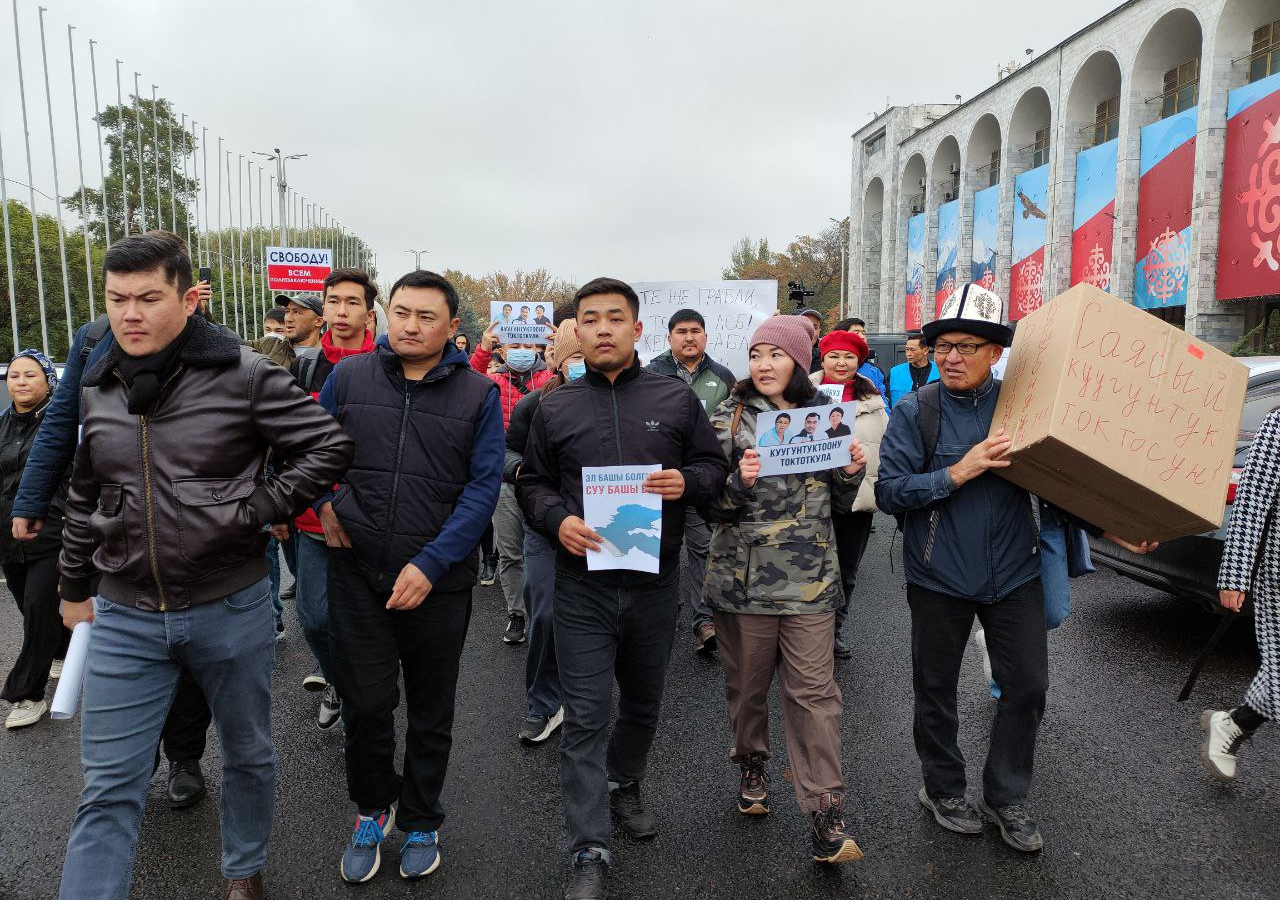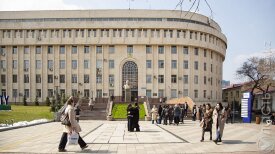For more than 11 months, authorities in Kyrgyzstan have banned public protests and gatherings in the central areas of the capital Bishkek. Police have repeatedly dispersed public gatherings and detained protesters, who braved these blanket bans. Protesters spoke out on the war in Ukraine, and the recent transfer of the territory of the Kempir-Abad water reservoir to Uzbekistan under a controversial border deal, all topics that the government wants to keep out of the public conversation.
In January, a gathering of elderly women was dispersed and the participants detained for rallying in support of those arrested during the the Kempir-Abad protests. These are examples of a deteriorating freedom of assembly in Kyrgyzstan and are part of the increasingly non-democratic practices implemented under President Sadyr Japarov, who came to power after a violent change of government in October 2020.
Why are these bans problematic?
The right to freedom of peaceful assembly is not an absolute right under international law, but governments are only allowed to restrict this right as a last resort in exceptional circumstances. A UN leading expert on these rights stressed that blanket bans on peaceful protests are “intrinsically disproportionate”. Nevertheless, there have been periodic blanket bans on protests across the globe, in countries such as Cyprus and France, among others, during the COVID-19 pandemic.
As International Partnership for Human Rights documented in the past, blanket bans on peaceful protests have repeatedly been used in Kyrgyzstan in recent years, with local courts banning protests for several weeks a time in central areas of Bishkek on the basis of vague arguments, such as the alleged need to fight religious extremism, prevent traffic congestions, and avoid “discontent” and “disturbance” for other residents. These bans have been selectively enforced to silence the expression of unwelcome opinions.
In the past year, however, the use of this controversial tactic has reached a new level. Shortly after Russia launched its war on Ukraine, a local court in Bishkek banned peaceful protests outside the Russian embassy, as well as outside the presidential administration and parliament, and on the main Ala-Too Square, in a move clearly aimed at preventing peaceful protests against the war - a sensitive issue to Japarov’s government.
The ban came after the Russian embassy issued an official note to the local authorities, requesting a stop to rallies outside its premises. And it was followed by several more court-sanctioned bans, with the Pervomaisky District Court most recently prolonging a ban on rallies near the Russian embassy, the house of parliament, the presidential palace, and at other central locations until 31 March 2023. As customary, "municipal and state events’’ were exempted from the ban, which reflects the ban’s discriminatory approach and undermines the authorities’ claims that the limitations are aimed at avoiding "discontent and disturbances" among locals.
Those wishing to protest have been instructed to gather at a location designated by the authorities: Gorky Park. Japarov said that protesters are allowed to hold rallies there “24/7” and "say what they want", as long as they “leave embassies alone”. However, this is not a desirable location for protesters who want to make sure that their messages are loudly and clearly heard.
The extended blanket bans on peaceful protests in central Bishkek have given the authorities under Japarov a convenient tool to selectively disperse peaceful protests on issues that are not to their liking. Moreover, in March 2022, lawyer Nurbek Toktakunov was detained by police for criticizing the initial, court-imposed blanket ban on protests outside the Russian embassy. He was convicted of petty hooliganism, and ordered to spend five days behind bars. Other people faced similar charges. In October, three people holding single pickets were also arrested outside the Russian embassy in Bishkek.
Sharp criticism from the Ombudsperson and the UN
Although he was the only one to have served in prison for this, Nurbek Toktakunov is not the only one to have criticized the recent blanket bans on protests. Kyrgyzstan’s Ombudsperson, Atyr Abdrakhmanova, also expressed disagreement with this practice, saying it is unconstitutional and contradicts Kyrgyzstan’s international obligations. And, the UN Human Rights Committee - an expert body which supervises states’ compliance with the International Covenant on Civil and Political Rights (ICCPR) - criticized this practice when scrutinizing Kyrgyzstan’s human rights record in November 2022. In a report on Kyrgyzstan, the UN Human Rights Committee called on the Kyrgyzstani authorities to
Kyrgyzstan’s government should listen and act on this criticism, comply with their obligations to safeguard the right to freedom of peaceful assembly as protected by the country’s Constitution and immediately lift the current blanket ban on peaceful protests in central areas of Bishkek. If the authorities are serious about their proclaimed commitment to democratic standards, they should demonstrate that they can tolerate the expression of dissent - also in front of the Russian embassy or on Ala-Too Square.
Alva Omarova is a researcher for International Partnership for Human Rights. IPHR is an independent, non-governmental organization founded in 2008. Based in Brussels, IPHR works closely together with civil society groups from different countries to raise human rights concerns at the international level and promote respect for the rights of vulnerable communities. See more at: https://www.iphronline.org/en/
Читайте на русском здесь.
Поддержите журналистику, которой доверяют.








